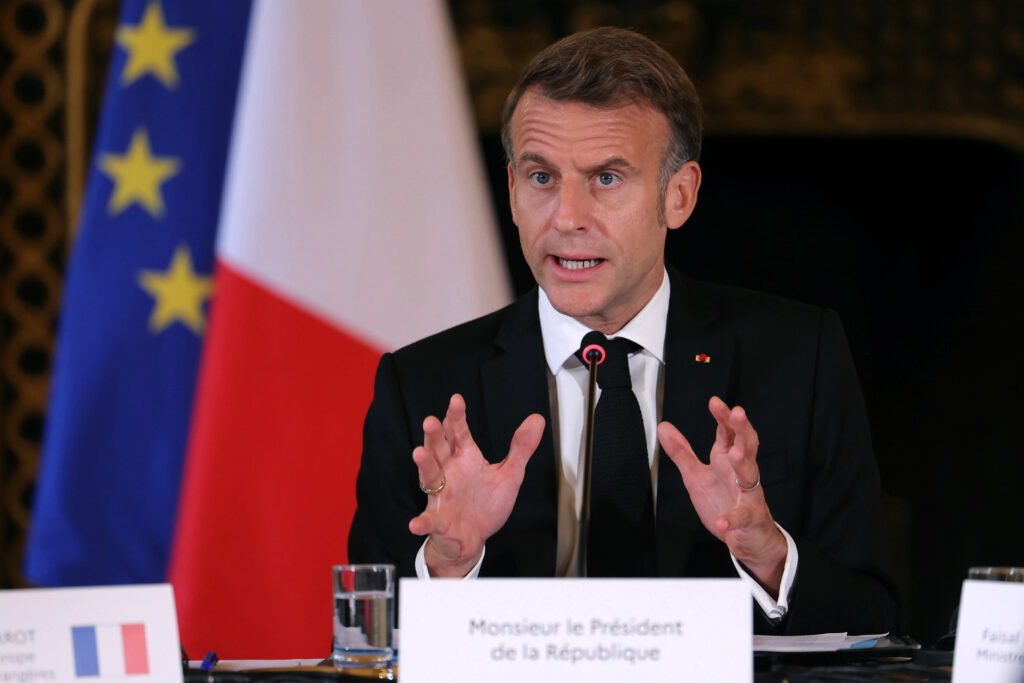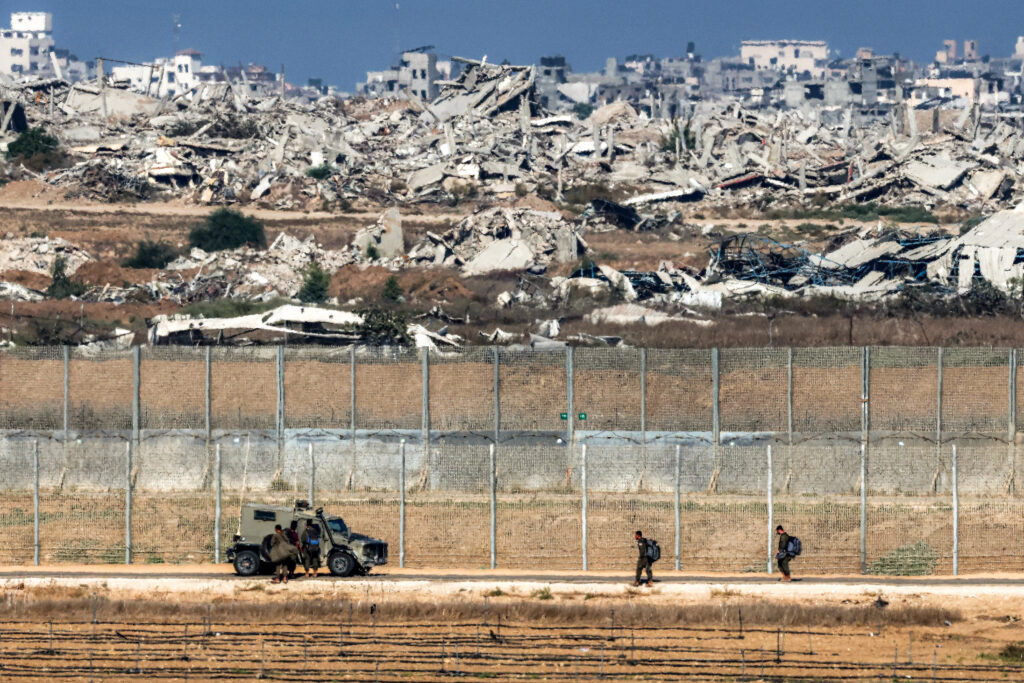Gaza aid flotillas to continue: Brazilian activist
Brazilian activist Thiago Avila, one of the main organizers of the international aid flotilla to Gaza, said Thursday that the movement to get life-saving relief to the devastated Palestinian enclave would continue, after a ceasefire was announced between Israel and Hamas.”There is nothing in the ceasefire agreements to indicate that the illegal blockade of Gaza by Israel, the United States, or any other nation will end,” he told reporters upon his return to Brazil.”As long as there is no justice for the Palestinian people, the flotilla will continue.”Avila was one of 13 Brazilians aboard the Global Sumud Flotilla of 45 vessels intercepted by Israel last week. Israel detained and deported more than 470 people aboard the boats, including Swedish climate campaigner Greta Thunberg.Israel has blocked several international aid flotillas in recent months from reaching Gaza, where the United Nations says famine has set in after two years of a devastating Israeli military offensive.Israel enforces a blockade on the territory, and has slashed the amount of humanitarian aid allowed into the enclave while the war has raged.Several activists on board the flotilla reported mistreatment in detention, which Israel denied.”Obviously, there were violations that will be the subject of complaints in international courts, but they are nothing compared to what the Palestinians are suffering,” said Avila.He reported cases of “physical violence” and “forced interrogations” of activists. “Diabetics have gone three days without access to insulin,” he said.Israel and Hamas on Thursday agreed a ceasefire deal after more than two years of war sparked by Hamas’s October 2023 attack on Israel.Israel’s retaliatory campaign has reduced much of Gaza to rubble — including schools, hospitals and basic infrastructure — and killed at least 67,194 people, according to the territory’s health ministry.
Ligue 1: Adi Hütter limogé, le Belge Pocognoli pressenti, grandes manoeuvres à Monaco
L’entraîneur autrichien de Monaco Adi Hütter a été démis de ses fonctions jeudi, victime de résultats en dents de scie et d’un style de jeu peu apprécié de ses dirigeants, et devrait être remplacé par le Belge Sébastien Pocognoli.Depuis le début de saison, le président Dmitry Rybolovev, qui possède 66% de l’AS Monaco, a suivi assidument les prestations de son club. C’est peu dire que les défaites à Bruges en ouverture de la Ligue des champions (1-4), puis à Lorient (1-3) en Ligue 1, où le milliardaire russe s’était déplacé, ne lui ont pas plu du tout. Outre les résultats, le contenu ainsi que l’incapacité de Hütter à faire évoluer son système ont surpris Rybolovlev. Certes, l’entraîneur de 55 ans, arrivé dans la Principauté à l’été 2023, a dû faire face à une multitude d’absences mais la direction a estimé que la dynamique de son équipe n’était plus bonne.En outre, même s’il a demandé à son directeur général Thiago Scuro, de réduire la masse salariale de l’effectif (de plus 25% en 3 ans) et de dégager environ 100 millions d’euros de balance positive au mercato, Rybolovlev n’a pas apprécié le départs des pépites Eliesse Ben Seghir à Leverkusen (pour 30 millions d’euros) et Saïmon Bouabré à Neom (10 millions). Il avait personnellement reçu les joueurs pour les dissuader, en vain tant ces derniers exprimaient des réticences à l’égard du management de Hütter.Le Russe a estimé que la trêve internationale était le bon moment pour ouvrir une nouvelle page. Il en avait fait de même en octobre 2018, limogeant Leonardo Jardim pour nommer Thierry Henry, avant de rappeler le Portugais quatre mois plus tard.- Pocognoli, très exigeant -Mais outre l’inexpérience d’Henry au poste, Monaco était alors en perdition sportive. Ce n’est pas le cas aujourd’hui.Hütter présente un bilan très correct à la tête d’une équipe qu’il a qualifiée deux saisons consécutives pour la Ligue des champions. Monaco pointe à la cinquième place de L1 (13 pts) et a arraché le nul contre Manchester City en C1 (2-2). Il a dirigé 93 fois l’équipe avec un bilan de 49 victoires, 18 nuls et 26 défaites. Mais il n’a remporté aucun trophée. Hütter qui, comme ses adjoints Christian Peintinger et Klaus Schmidt, avait prolongé en janvier son bail sur le Rocher jusqu’en 2027, pourrait prétendre à plus de 6 millions d’euros d’indemnités.Jeudi après l’entraînement, les trois techniciens autrichiens ont annoncé leur départ aux joueurs. Ils avaient été avertis un peu plus tôt de la fin de leur mission.Désormais, Monaco compte sur Sébastien Pocognoli. A 38 ans, cet ex-international belge a joué dans son pays à Genk, au Standard de Liège et à l’Union Saint-Gilloise où il a terminé sa carrière. Il a également évolué aux Pays-Bas (AZ Alkmaar), en Allemagne (Hanovre) et en Angleterre (West Bromwich et Brighton).En tant qu’entraîneur, il ne peut se prévaloir que d’une saison au plus haut niveau, à l’Union Saint-Gilloise, où il est toujours sous contrat et qu’il a mené au titre de champion de Belgique. Pocognoli y a dirigé 69 rencontres. Il est considéré comme un entraîneur très exigeant. Le néo-Niçois Charles Vanhoutte évoque “un très bon coach” avec lequel “étape par étape, j’ai progressé”.Après la victoire de l’Union à Eindhoven contre le PSV (3-1) lors de la première journée de C1, le jeune entraîneur insistait: “quels que soient les joueurs qui entrent dans l’équipe, il n’y a pas de vague” dans les performances.Il reste toutefois sur deux défaites, contre Newcastle (0-4) à domicile, puis à Bruges (1-0), où Monaco avait sombré.
Macron warns Israeli settlements threaten Palestinian state
French President Emmanuel Macron warned Thursday that expanding Israeli settlements threatened a Palestinian state and US-led peace efforts, as France hosted Arab and European ministers to find ways to boost the Palestinians after a Gaza ceasefire deal was announced. Macron hailed the ceasefire deal as a “great hope” for the region, but said the “acceleration” of settlement construction in the occupied West Bank was an “existential threat” to a Palestinian state.It was “not only unacceptable and contrary to international law” but “fuels tensions, violence, and instability”, he said in opening remarks to the meeting in Paris. “It fundamentally contradicts the American plan and our collective ambition for a peaceful region.”Israel and Hamas earlier agreed a Gaza ceasefire deal to free the remaining living Israeli hostages held by the Palestinian militant group. It is being seen as a major step towards ending a war that has killed tens of thousands of people and unleashed a humanitarian catastrophe.The deal brokered through indirect talks in the Egyptian resort of Sharm el-Sheikh came two years after the October 7, 2023 attack by Hamas on Israel, which triggered a relentless retaliatory assault on Hamas-ruled Gaza.While Europe has strongly supported the ceasefire efforts led by US President Donald Trump, Washington and several European countries are at odds over whether it is the right moment to recognise a Palestinian state.Macron, in a September 22 speech at the United Nations, recognised a Palestinian state on the heels of similar announcements by Canada, Portugal and the United Kingdom.The Paris meeting brought together the top diplomats of five key Arab states — Egypt, Jordan, Saudi Arabia, Qatar and the United Arab Emirates — with European counterparts from France, Italy, Germany, Spain and the United Kingdom. Turkey and the European Union were also represented.- ‘Unnecessary and harmful’ -“A ceasefire is not yet a lasting peace,” said French Foreign Minister, Jean-Noel Barrot. “It is the first step on a long road to a political solution that will guarantee Israel’s security while recognising the legitimate rights of the Palestinians to a state.”France is hoping that backing up its recognition of a Palestinian state by discussing what happens the “day after” the war ends can boost the prospects of a two-state solution, which Paris still regards as the sole chance for long-term regional peace.The ministers discussed participating in the International Stabilisation Force evoked by Trump as part of his peace plan and support for the Palestinian Authority which runs the occupied West Bank.Before the ceasefire deal was announced, the Paris meeting had angered Israel, further straining French-Israeli relations in the wake of Macron’s recognition of a Palestinian state.Israeli Foreign Minister Gideon Saar had in a message on X denounced the “unnecessary and harmful” meeting “concocted behind Israel’s back” at the sensitive moment of the negotiations in Sharm el-Sheikh.
What we know about the new Gaza deal
Israel and Hamas on Thursday agreed a ceasefire deal to free hostages held in Gaza in exchange for hundreds of Palestinian prisoners detained in Israeli jails.Here is what we know so far about the agreement, reached in indirect talks in Egypt:- Hostage, prisoner releases -Israel said the final draft of the first phase of a ceasefire deal had been signed by all parties, and included an agreement for the release of all hostages held in Gaza, both living and deceased.Of the 251 people abducted during Hamas’s October 7, 2023 attack, which sparked the war in Gaza, militants still hold 47, including 25 the Israeli military says are dead.In exchange, Israel will release nearly 2,000 Palestinian prisoners: 250 of whom are serving life sentences, and 1,700 others detained since the start of the war, a top Hamas official told AFP, speaking on condition of anonymity.There has been no indication that Israel will disclose the names of those set for release.- Prisoner lists -A key point in the negotiations was a list of Palestinian prisoners submitted by Hamas, whom it wants released from Israeli jails in the truce’s first phase.High-profile inmate Marwan Barghouti — from Hamas’s rival, the Fatah movement — is among those the group wanted to see released, according to Egyptian state-linked media.But Israel said Barghouti — a figure sometimes called the “Palestinian Mandela” by supporters, but considered a terrorist by Israel — would not be part of the exchange.- Aid -A daily minimum of 400 trucks of aid will enter the Gaza Strip for the first five days of the ceasefire, to be increased in following days, the Hamas source said.The Egyptian Red Crescent said an initial 153 trucks were headed into Gaza via the Rafah border crossing.The World Health Organization chief, Tedros Adhanom Ghebreyesus, said his agency was prepared to “scale up its work to meet the dire health needs of patients across Gaza, and to support rehabilitation of the destroyed health system”.The deal also provides for the “return of displaced persons from the south of the Gaza Strip to Gaza (City) and the north immediately”, the Hamas source said.- ‘Scheduled withdrawals’ -Israel said its military would redeploy to an agreed-upon “yellow line” within 24 hours.The deal stipulates “scheduled withdrawals” of Israeli troops, the Hamas official said, and includes “guarantees from President Trump and the mediators”.- Key questions remain -Trump’s 20-point peace plan, on which the indirect negotiations were based, calls for the disarmament of Hamas and for post-war Gaza to be ruled by a transitional authority headed by Trump himself.But these points are yet to be addressed.Senior Hamas official Osama Hamdan said the Palestinian Islamist movement rejected the planned transitional authority.”No Palestinian would accept this. All the factions, including the Palestinian Authority, reject this,” Hamdan told Qatar-based broadcaster Al Araby.Trump said the issue of Hamas surrendering its weapons would be addressed in the second phase of the peace plan.”There will be disarming,” he told reporters, adding there would also be “pullbacks” by Israeli forces.Palestinian president Mahmud Abbas said he hoped the Gaza deal could lead to the establishment of an independent Palestinian state.But Netanyahu and members of his cabinet have repeatedly vowed to prevent that from happening.- What next? -Israel’s security cabinet was due to discuss the plan Thursday at 1400 GMT, followed by a full government meeting an hour later.The ceasefire will take effect “within 24 hours” of the security cabinet meeting, Israeli government spokeswoman Shosh Bedrosian told journalists.”All of our hostages, the living and the deceased, will be released 72 hours later, which will bring us to Monday,” she said.A Hamas official said negotiations for the second phase of the ceasefire would begin “immediately”.Negotiations in the Egyptian resort town of Sharm El-Sheikh have been taking place under lock and key in a conference centre.burs-bha-acc/jd/jhb/jsa




